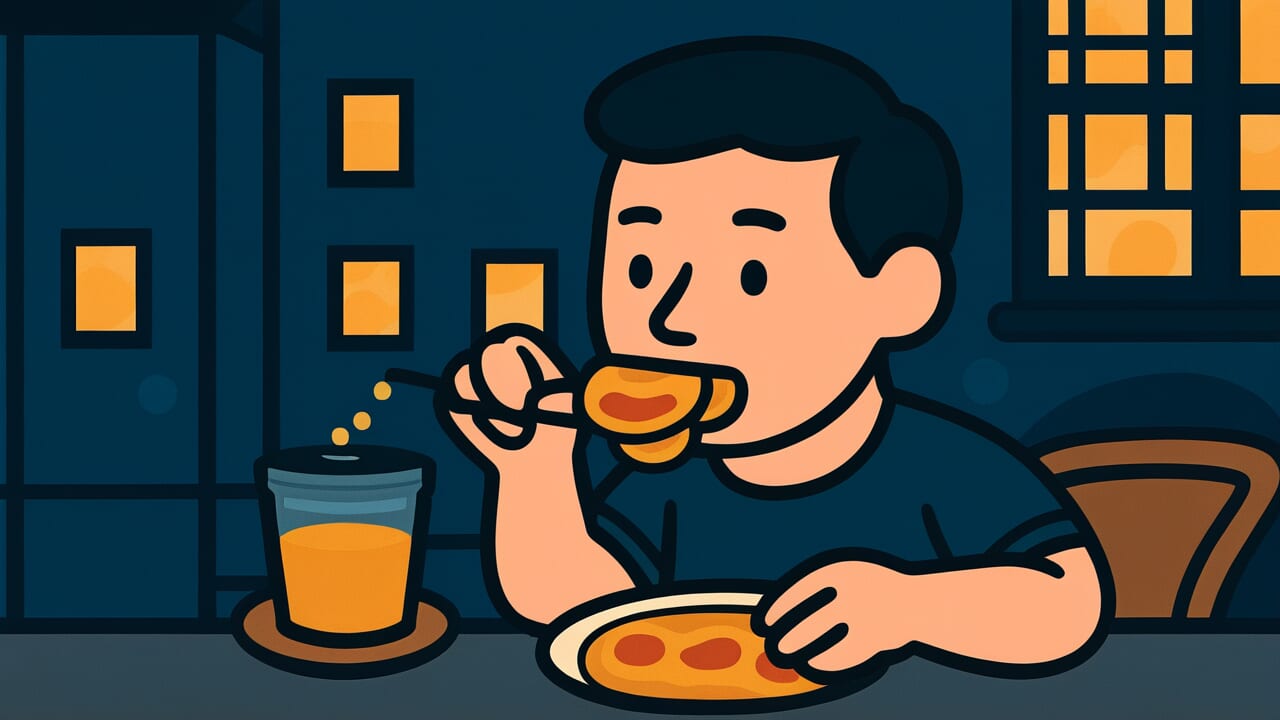How to Read “Eat delicious food in the evening”
Umai mono wa yoi ni kue
Meaning of “Eat delicious food in the evening”
“Eat delicious food in the evening” teaches that you should eat delicious things early in the night. This isn’t just about meal timing. It represents life wisdom about enjoying good things at the right moment.
People use this proverb when someone is putting something off. They use it to say “now is the time.” If you save delicious food for later, it might lose freshness. Someone else might eat it. You might never get to eat it at all.
That’s why the proverb teaches us to seize good opportunities. Don’t let them slip away. Enjoy them when they come.
Even today, people use it to stress the importance of acting at the right time. Don’t put off chances. Everyone has experienced missing an opportunity while thinking “I’ll do it someday.”
This proverb still lives on as practical advice. It helps us avoid that kind of regret.
Origin and Etymology
No clear record exists of when this proverb first appeared in writing. The exact origin remains unknown. However, the words themselves connect deeply to traditional Japanese lifestyle.
“Yoi” refers to the time right after sunset. It means evening to early night. The teaching about eating delicious food during this time had several practical reasons.
First, people had no refrigeration technology back then. Managing food freshness was crucial. Fish or meat bought in the morning would only stay delicious until evening, especially in summer. Keeping it until the next morning meant it would likely spoil.
Second, health concerns played a role. Eating late at night is bad for digestion. Eating during yoi left enough time before sleep. This reduced the burden on the body.
Third, lighting mattered too. Without electricity, it got very dark as night deepened. Cooking and eating became difficult. During yoi, some brightness remained. People could slowly savor delicious food.
All this life wisdom condensed into this proverb.
Usage Examples
- We bought expensive sashimi, so let’s eat it tonight. After all, eat delicious food in the evening.
- I found a delicious-looking restaurant on this trip. Eat delicious food in the evening, they say, so let’s go today instead of waiting until tomorrow.
Universal Wisdom
The proverb “Eat delicious food in the evening” contains wisdom about human weakness and how to overcome it.
We humans have a psychology of wanting to save good things. We think “for a better occasion” or “for a more special day.” We put off enjoyment. This seems like a planned and wise attitude at first glance.
But actually, this psychology often hides something else. It hides self-denial like “I’m not worthy yet.” It hides baseless expectations like “a better future will come.”
Our ancestors saw through this human nature. They knew what happens when you save good things. Freshness fades. Opportunities pass. Or that “special day” never comes at all.
They must have witnessed this life truth countless times.
This proverb has been passed down for so long because it’s not just about meals. It’s about life itself. Happiness doesn’t exist in the distant future. It exists in this very moment.
Our ancestors conveyed this truth through the familiar example of “delicious food.” Cherishing the present is the secret to living without regret. This proverb teaches us that quietly but powerfully.
When AI Hears This
The human brain cannot evaluate “immediate joy” and “future joy” as equal values. Behavioral economics research shows people discount future rewards by 30-50% annually. In other words, tomorrow’s 100 yen feels worth only about 70 yen today.
What’s interesting about this proverb is this: saving delicious food until morning actually carries double loss risk. The first is physical risk that the food will spoil. The second is psychological risk that tomorrow morning’s full self won’t want that dish as much as now.
A hungry brain activates its reward system. It values food up to five times higher. Today’s self and tomorrow morning’s self fundamentally differ in how they evaluate the same dish.
Even more interesting is the connection to “loss aversion” shown by prospect theory. People feel the pain of loss more than twice as strongly as the joy of gain. Passing up satisfaction you can definitely get now registers in the brain as “loss of certain reward.”
Meanwhile, the risk of not being able to eat tomorrow gets dismissed as “uncertain future loss.”
This proverb was a surprisingly rational decision-making rule. It considered both time discounting and state-dependent value judgment.
Lessons for Today
This proverb teaches us modern people about the value of “now.”
In modern society, we can preserve almost everything. We have refrigerators and cloud storage. We have environments where we can always put things off. But that’s exactly why we tend to postpone important things.
“When I have time someday” or “when I have more room in my life.” Everyone has experienced saying these things and never actually doing them.
This proverb asks us a question. Are you putting off what’s truly important? Meeting people you want to see. Challenging things you want to do. Expressing gratitude. These things cannot be stored in a refrigerator.
Today will never come back. We must not overlook the freshness of this moment. The value that exists only now. Don’t wait for perfect timing. Realize that now is good enough timing.
That is the most important message this proverb gives to modern people.



Comments